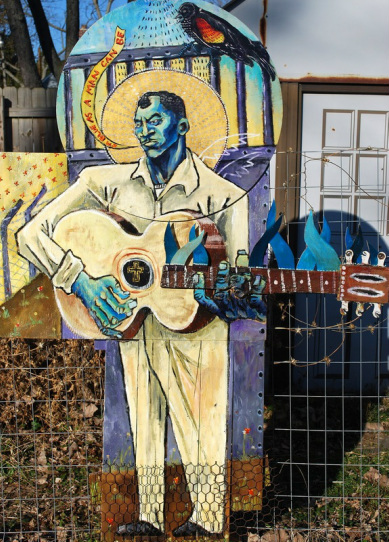The Legend of Robert Pete Williams

Listening to Robert Pete Williams isn't entertainment. He doesn't groove in the typically danceable way that the blues is supposed to and there are few of the hot licks that are a part of the music's tradition. Williams sings in a plaintive voice that is often lyrically incoherent and plays with an erratic complexity that defies the traditional eight, twelve or sixteen bar forms that we generally think of as the blues. Like Big Joe Williams, he is a kind of rambling, unintelligible and blunt virtuoso.
Formula tends to be the death knell of creativity, unless you really have the necessary gifts. Keith Richards used to say that the appeal of rock and roll was to see how much could be done within the inherent limitations of the music—or something to that effect. After hearing one too many variations of Brown Sugar over the past forty years, the music's limitations may have gotten the best of him.
Robert Pete had no such problem; he performed without a set-list, never playing any of his songs the same way twice. His music was almost completely improvised, unpredictable and deeply personal, lacking any traditional structure or form; it was unselfconsciously Avant-garde, crude, sophisticated and completely original.
He was in other ways the archetypal bluesman, having spent time in Angola Prison for murder. This gave him what might be thought of as street-credibility by the white urban, college educated audience that chose to see the blues in sociological terms—as a metaphor for the hard times and hard life of poor southern blacks. He was a walking, talking ideal of the bluesman as imagined by his new fans—a piece of living history, reflecting a time and place that was as foreign to his devotees as darkest Africa and as close as the Louisiana bayou .
Williams drove a dump truck by day, picking up old scrap metal as a means of making a living, augmented by a career as one of the blues' most compelling and original stylists. His music was the product of a relentless drive to experiment with freedom and form, all accomplished and imagined without the formalized, European, intellectual values or philosophizing that are seen as a necessary component in fashionable “experimental” art.
In the early 1970’s, he was interviewed by Peter Guralnick for his book “Feel Like Going Home” saying that he developed his style by listening to nature, the birds and the natural sounds around him. Apparently, there was a time when he played in a more or less traditional way, but then he had a revelation—and developed a new way of performing. It is the same epiphany that all artists hope to have at some point in their life.
Williams sounded like no one else, and where it may be hard to sit and listen to his music in long stretches, as is the case with many country bluesmen, in short bursts it offers a uniquely weird and wonderful experience. Just about the time you think, I can't take another variation of whatever the latest style of popular music is—the kind of product that oversaturates the culture—Robert Pete Williams offers a very appealing antidote.
Williams didn’t exactly die in obscurity or poverty; he found a measure of fame and respect. Like so many other artists that lived on the margins in defiance of an oftentimes predictable world—it wasn’t enough.
Mark Magula